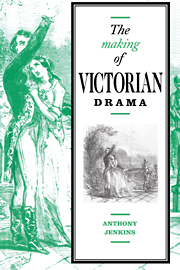Book contents
2 - The grandeur of Nature
Published online by Cambridge University Press: 22 September 2009
Summary
There are two sources from which we should now seek the tragic influence,… the Simple … Tales of a household nature, that find their echo in the hearts of the people … Another and totally distinct source of modern tragedy may be sought in the magnificent. True art never rejects the materials which are within its reach. The Stage has gained a vast acquisition in pomp and show – utterly unknown to any period of its former history.
Edward Bulwer, England and the English (1833)As a reflector of contemporary values, the theatre creates its own distorting filters which derive from the day-to-day compromises that the transmission of a text to an on-stage performance imposes: the talent and physique of the actors, the management's estimate of what will ‘go’ with the public, the personality of the prime-mover (chief actor, actor-manager, or modern director) which colours that estimate. This was particularly the case in the mid 1830s when those who thought at all seriously about the drama's power to comment on real life saw themselves as a noble rear-guard ranged bravely against the commercial savvy of a man like Alfred Bunn, manager of Covent Garden. And no occasion more sharply illumines the social and stylistic limits within which a playwright had to work than the moment when William Charles Macready entered the fashionable portals of Edward Bulwer's chambers in the Albany on 23 February 1836.
- Type
- Chapter
- Information
- The Making of Victorian Drama , pp. 30 - 62Publisher: Cambridge University PressPrint publication year: 1991



